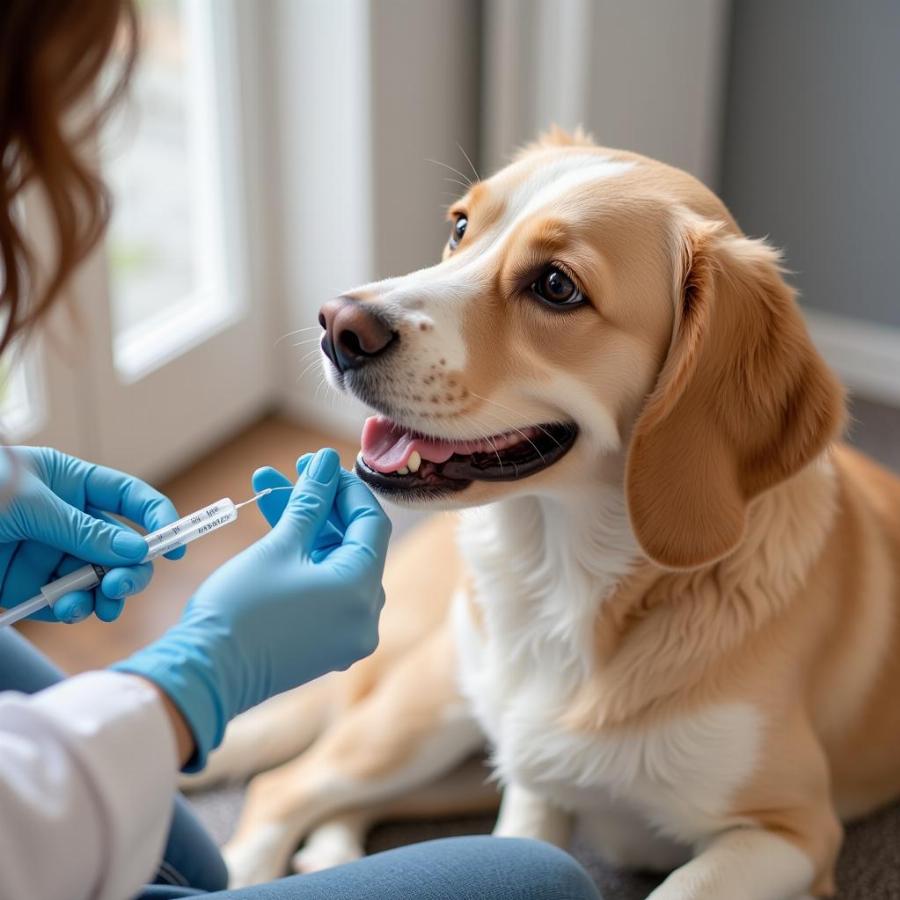Finding the right dog food can feel like a game of fetch – never-ending! And when your furry friend has allergies, the search becomes even trickier. Itchy skin, upset tummy, constant scratching – it’s tough to see your doggo uncomfortable. But don’t worry, we’ve got your tail covered. This guide dives deep into good dog food for allergies, helping you make choices that bring back those happy tail wags.
Understanding Food Allergies in Dogs
Before we sniff out the perfect food, let’s pawse (get it?) and understand what causes these pesky allergies. Just like humans, dogs can have adverse reactions to certain ingredients in their food. The most common culprits? Think proteins like beef, chicken, dairy, and even wheat.
When your dog eats something they’re allergic to, their immune system goes into overdrive, releasing histamines and causing a range of symptoms that can range from mild to severe.
Common Signs Your Dog Might Have a Food Allergy:
- Itchy Skin & Excessive Scratching: You might notice your pup constantly scratching, licking, or biting at their skin.
- Gastrointestinal Upset: Vomiting, diarrhea, or gassiness after meals can be telltale signs.
- Ear Infections: Food allergies often manifest as recurring ear infections in dogs.
If you suspect your furry friend might have a food allergy, a trip to the vet is your first port of call. They can help pinpoint the exact culprits through testing and guide you toward the best course of action.
Choosing the Best Dog Food for Allergies
Ready to find food that makes your pup’s tail wag with joy, not discomfort? Here’s what to look for:
1. Limited Ingredient Diets (LID):
Think of LID foods as the superheroes of the allergy world! They contain a limited number of ingredients, making it easier to identify and avoid potential triggers. Look for options with novel protein sources like venison, duck, or kangaroo – things your dog hasn’t eaten before.
2. Hydrolyzed Protein Formulas:
These formulas break down protein molecules into smaller pieces, making them less likely to trigger an immune response. Think of it like giving your dog’s system a head start on digestion!
3. Grain-Free Options:
While not all dogs with allergies are sensitive to grains, some are. Grain-free formulas often use alternative carbohydrates like sweet potatoes or peas.
Expert Tip from Dr. Emily Carter, Veterinary Nutritionist: “Always choose dog food specifically formulated for allergies. Look for the AAFCO statement to ensure it’s nutritionally complete.”
Transitioning to a New Food
Switching your dog’s food abruptly can lead to tummy troubles. Introduce the new food gradually over 7-10 days:
- Start by mixing a small amount of the new food with your dog’s current food.
- Slowly increase the ratio of new food to old food each day.
- Monitor your dog for any adverse reactions during the transition.
Beyond Food: Managing Allergies Holistically
Diet is crucial, but a multi-pronged approach can be even more effective:
- Omega-3 Fatty Acids: Supplements like fish oil can help soothe itchy skin and reduce inflammation.
- Regular Bathing: Keeping your dog clean can help minimize allergens on their skin.
- Flea Prevention: Fleas can exacerbate allergies, so maintain year-round flea control.
 Dog receiving allergy medication
Dog receiving allergy medication
Finding the Right Fit for Your Furry Friend
Choosing the best dog food for allergies can feel overwhelming, but remember: You know your dog best! Pay attention to their individual needs and consult with your veterinarian to determine the ideal diet. With a little patience and the right food, you can help your allergic pup live a happy, itch-free life!
FAQs About Dog Food for Allergies
Q: Can I give my dog human antihistamines for allergies?
A: Never give your dog any medication without consulting your veterinarian first. Human medications can be toxic to dogs.
Q: How long does it take to see results with a new food?
A: It can take anywhere from a few weeks to a few months to see noticeable improvements in your dog’s allergy symptoms.
Q: My dog has multiple food allergies. What are my options?
A: Talk to your veterinarian about prescription diets formulated for dogs with multiple sensitivities.
Q: Can puppies have food allergies?
A: Yes, even puppies can develop food allergies. Consult with your veterinarian to determine the best course of action.
Need More Tailored Advice?
Finding the perfect solution for your dog’s allergies is a journey. For personalized recommendations and expert guidance, reach out to Beaut Dogs at [email protected]. We’re here to help you navigate the world of canine nutrition and provide your furry friend with the best possible care. Visit Beaut Dogs today to explore a world of resources dedicated to your beloved companion.